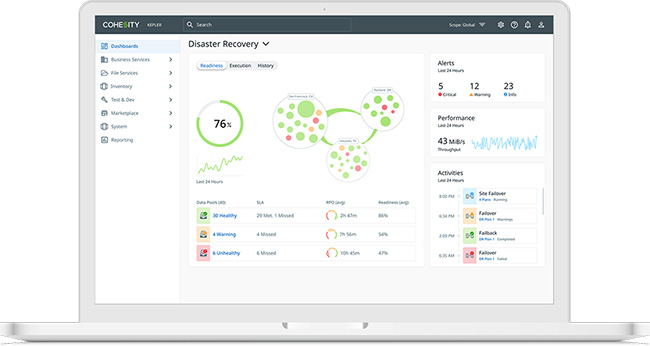Cohesity SiteContinuity: Protecting business-critical apps across a single platform
Cohesity announced Cohesity SiteContinuity, an automated disaster recovery solution that is integrated with the company’s backup and continuous data protection capabilities — making it the only web-scale, converged solution to protect applications across tiers, service levels, and locations on a single platform.

Cohesity is making this announcement as organizations are concerned about losing data to ransomware attacks, natural disasters, or human error. This new integrated solution will help companies ensure data isn’t lost, applications are available, costs are reduced — by eliminating redundant or unnecessary infrastructure — and that strict service-level agreements (SLAs) are met.
Today, many companies are not equipped to meet critical recovery objectives. In a recent study published by the Enterprise Strategy Group (ESG), when respondents were asked if their actual recovery times met their pre-established SLAs, 78 percent stated they are unable to “always” meet their objectives and 33 percent said they “sometimes” or “rarely” meet these objectives.
“Maintaining the integrity of our data in the face of a disaster or attacks is crucial and protecting our applications and data across various SLAs is complex and challenging,” said Steve Culy, senior systems engineer, Navis.
“The new solution from Cohesity is very timely as it allows us to protect our mission and business-critical applications on a single platform. We can now automate our business continuity and disaster recovery strategy, all from Cohesity’s data platform, making it easier for us to manage SLAs, and reduce downtime with automated, rapid failover and failback.”
“Cyber threats such as ransomware and growing natural disasters such as hurricanes or wildfires increasingly put critical applications and data at risk,” said Matt Waxman, vice president of product management, Cohesity.
“With that backdrop, this is an ideal time for IT leaders to rethink how they can simplify IT operations while also reducing costs with an integrated, web-scale, converged backup and disaster recovery solution.”
Elevating business continuity and disaster recovery
With Cohesity SiteContinuity, organizations can recover a single file, critical business application, or an entire data center with just a few clicks, automating recovery operations spanning across application tiers and on-premises and public cloud environments.
It dramatically simplifies the challenge organizations face in trying to manage complex hybrid and multi-cloud IT environments with numerous applications running across multiple tiers with varying service levels during the course of normal operations. Cohesity’s converged backup and disaster recovery solution provides:
- Simplified operations: Consolidate backup, continuous data protection and automated disaster recovery on a single platform, managed through one global UI and a unified policy framework, across application tiers, service levels, and environments.
- Near-zero application downtime and data loss: With just a few clicks, automatically orchestrate failover and failback of a single application or an entire site, ensuring minimum data loss and downtime as business applications are rapidly recovered in a disaster scenario.
- Flexible recovery: Journal-based recovery helps to meet varying service levels across application tiers by restoring to any point in time — including days or even seconds before the disaster hit, on-premises or to the public cloud.
- Machine learning-based ransomware detection and recommendation: At the time of failover and/or restore, Cohesity Helios’ machine learning algorithm helps identify a clean point in time to restore. This helps protect the DR site from malware impact during the failover process.
- Disaster testing: Meet DR compliance objectives with confidence through end-to-end automated non-disruptive disaster recovery testing, including complete audit trail reporting.
- Reduced TCO: Reduce costs by converging backup and DR, eliminating the need for separate point products and driving better storage efficiency. Further reduce data footprint and costs with global variable-length deduplication and compression across workloads. Additionally, there is no need to deploy dedicated virtual machines to support recovery of each ESXi host.
- Limitless scalability: The underlying web-scale architecture of the Cohesity platform enables organizations to scale BCDR capabilities limitlessly and painlessly.
“Application availability and protecting data against disasters is vital for us,” said Francois Lepage, cybersecurity and infrastructure manager, Master Group.
“And, we believe this new solution from Cohesity could easily empower organizations to strengthen their business continuity and disaster recovery strategy. A single platform that can automate DR orchestration, while also managing backups from a single policy has the power to be a transformative technology.”
“Business continuity continues to increase as a priority for many end customers. When a disaster strikes, they need simple, quick recovery as downtime and data loss are not an option,” said Brian Ellis, vice president, advanced solutions, Tech Data.
“Cohesity’s new solution offers converged backup and automated DR on a single platform with automated failover and failback orchestration for near-zero downtime. This solution changes the game for our partners and their customers.”
“With the increased frequency and cost of cyberattacks, a robust set of disaster recovery processes combined with proven technology have never been more essential,” said Christophe Bertrand, senior analyst, ESG.
“Organizations should look for ease of use, automation and the ability to truly control their data recovery and application availability service level agreements. That’s why Cohesity’s web-scale converged backup and disaster recovery solution is not only timely, but also offers a comprehensive set of capabilities to take on the disaster recovery challenges enterprises face.”
This solution will be generally available in the fourth quarter of the calendar year 2020.